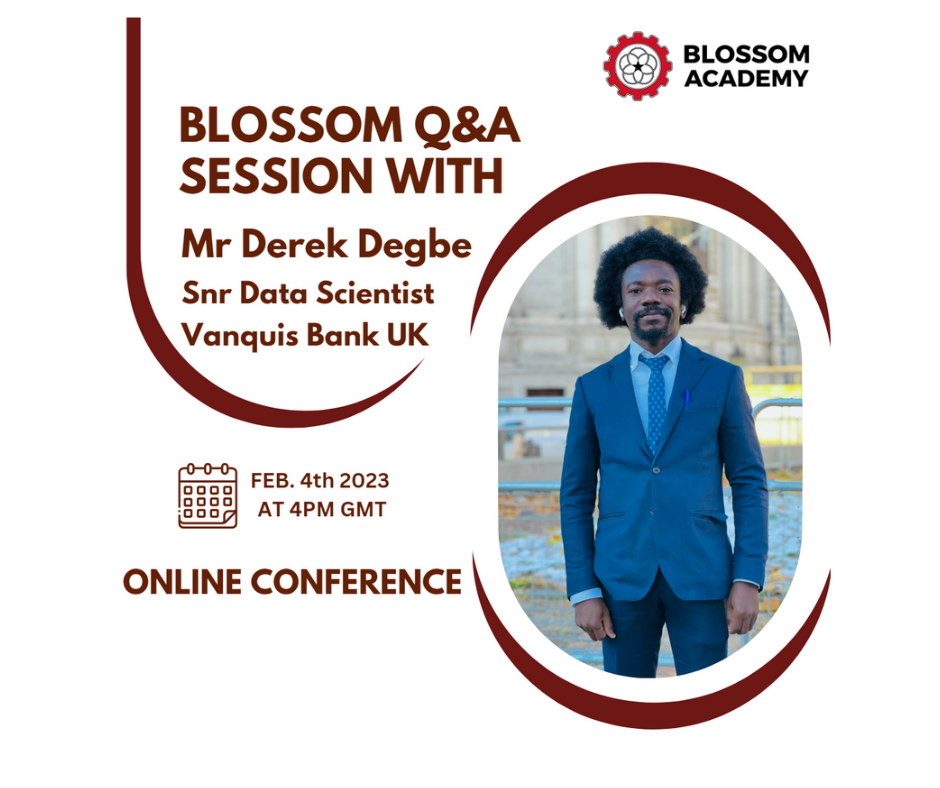- Kindly share with us your background and your journey as a Data Scientist.
I read BSc Actuarial Science at KNUST between 2012 and 2016. Then I went on to do my national service at the SIC insurance company office in Tarkwa. I decided to return to the university to study for my MBA. This time around, I specialised in management information systems. So that’s more like the actual work data scientists do, but it’s in a different context. You have to understand things from a socio-technical point of view about human needs and what technologies can be used to solve them. Starting the journey in data science is often about what language to learn and what programming language to choose at some point in time. So it was basically about experimenting with everything. You do a little Python today. Tomorrow, somebody might present something using maybe Java. You’re going to study Java a bit, then R because somebody said, “oh, R is cool,” and then you do GO. In the end, you will build a lot of resilience and appreciation for whatever you are studying because you can apply it in the future.
2. What are some of the challenges you’ve faced along the journey of becoming a senior Data Scientist at Vanquis Bank, and how have you overcome them?
Even before you decide to become a data scientist, it always has to do with what got you to where you are. You may have a background like mine. I studied actuarial science. That means that when you look at the courses I studied, it’s mainly mathematics, statistics, a bit of finance, risk analysis and insurance. Everything is in there. And four years is enough to say that you can start a very good data science journey. But the good thing from my side is that when it comes to developing my journey through finance, insurance, or risk, I can have a very good background to start a firm. And that is the whole idea about me understanding the business needs of a business or a company and how I can fit in well whenever I’m given the responsibility. That first challenge is very difficult for everybody to work through, especially if you’re in Ghana, because you don’t necessarily have a lot of opportunities to study or to actually get hands-on experience with what you’re doing. It’s very easy for you to say, “I love computer vision, I want to experiment with Resmit or I want to experiment with the latest version of Yolo.” Because you’ll do all of these, but the thing is, where does it lead you to? The second aspect of it is technology. When you start the journey, everybody is going to spend so much time on technologies trying to understand what language to even learn and all of that.
3. In total, how long have you been in the data space, and what tools do you advise aspiring data professionals to be proficient with?
Because we sort of spend a lot of time in the academic sphere, you get to experiment with tools that are even more complicated, but you don’t even get to use them. In the real world, somebody does a lot of Excel work manually every day, and he is working as a data scientist or a data engineer. When you get to the real world, you will realise that we don’t even need them. About 80% of companies in the UK don’t work with the tools that we learn. What it means is that these tools may not make you relevant to the job market. Currently, we are spending about three years migrating from SAS environments. So we’re dealing with Snowflakes and Snowpark, and I can maybe use my DBT to transfer all our data and then load them into our Snowflake database.
4. What problems are you interested in solving at Vanquis Bank and why?
We have a lot of problems that we solve internally for our companies. For every company you work for, you have clients. If you’re working for Microsoft or IBM, you work for their clients, and they sometimes solve problems for their clients. We give credit cards, we give loans, and we give vehicle finance to people who want to purchase a vehicle within their country. This year, for example, we want to give up to 200 million pounds in loan credits to people within the UK. So what it means is that we will build a lot of models around dormancy, delinquency and forbearance. We will build models for our propensity to pay and our propensity to leave. And basically these ones will solve real problems for our teams in markets and our teams in coalition. Our team at risk and our data science team all rely on the models we build to be able to do their work.
5. You were recently endorsed by Tech Nation for the UK Global Talent visa under “Exceptional Promise in Artificial Intelligence.” Kindly tell us more about the process to obtain this opportunity.
A Global Talent visa is an opportunity that the UK gives to people who may want to settle here(UK) and work. If you have an award from any of these top research institutions within the UK, like we have a Queen’s Award, then you wouldn’t need anything when applying for these visas. Global Talent is supervised by Tech Nation. Tech Nation is responsible for giving endorsements to people who have demonstrated that they have worked in IT or artificial intelligence for a long time. So you are looking at people who are able to demonstrate that they have been in the field for the past three to five years, either working or having startups. If they have startups, they apply for Exceptional Talent. Exceptional Talent means that they have three years to get their indefinite leave to remain. Once they have their indefinite leave, that means they will be on the shorter route to becoming British citizens. However, if you’re under Exceptional Promise, you’ll take five years.
6. What advice would you give to aspiring data practitioners who want to become international data practitioners such as yourself?
Everybody has an opportunity to be where they want to be. You just have to find a way to own your journey because your journey is quite different from mine. We are very fortunate to have a lot of platforms like LinkedIn or GitHub where you can share all of the things you’re doing and people will definitely watch. In the real world, nobody cares about your degree because, I mean, who cares about you having a PhD, a master’s, or whatever on your CV? Just come and show us what you can do. Probably, we will consider you and have you go through the interviews, and then you will get to join the company. So yeah, career development is all about what you’re doing and how you’re doing it. How you’re making sure that it is reducing costs and adding value to the company.
7. As a data scientist with roots from Ghana, what problem in Africa are you most interested in solving using data and why?
We’ll be meeting in Rwanda for the AU and DEC in a PAT workshop, like we do in the continental AI framework. So hopefully, we are making a lot of contributions because of our ideas and how the policy should be guiding Africa to also be part of what is happening because we currently don’t have so much to contribute. I mean, if 80% of our people even get to appreciate or know what technology is doing for humanity, maybe we can see a lot of progress.
8. The market is getting saturated now. How do you stay relevant, and as a recruiter, what do you look out for?
Getting job interviews and getting jobs is work. If you get that one done, and you join the organisation, you can actually build a roadmap to have yourself stay in the organisation. Because it’s only after you join that you understand the problems we are solving. A lot of people getting into the field have either no idea about it (data science) or have an idea about it. Those who have ideas about it and get the right mentoring will go really far. Those who have no idea about it and who get the right mentoring struggle, but if they keep going, they can stay within it. There are actually a lot of those who have no idea and are also not going to get the right mentoring. I will say make commitments to building a very relevant CV that can actually give you interviews. Even if you apply for 20 jobs and get five jobs calling you back, that’s a step. If you don’t get texted back, you’ve tried. You’re sure to get it the next time you’re called.
9. I want to have a data science role within a year. However, jobs in the market require industry experience. How do you get projects when you’ve not been employed?
One of the things you could do is spend time on data. This means you’re learning your database well, you’re learning SQL well, and you’re actually learning how to transform the data well. In this, you have a project like using DBT to transform the data and then maybe even wrapping it up at the end of the day with a fast APR application, before maybe using Docker to deploy it. You can surely show these in a snapshot to demonstrate your capability to understand how to use them or how to go from extracting data all the way to using them to build a pipeline or even building a model with them and deploying the model.
You can also teach. What’s interesting is that you don’t even get to be given any material to start working. You are coming in to show us what curriculum we should use to teach data science. You can also join freelance platforms and make contributions. A lot of the freelance projects that you see online are actually real projects that companies are solving, just that they lack technical capabilities. Truth be told, about 70% of the skills I acquired from Ghana were from teaching because I taught in almost every institution that you know. We were teaching while solving problems practically on the other side.
Kickstart your career in analytics by joining the next Blossom Academy Fellowship program. Express interest at www.blossom.africa or email us at [email protected].

